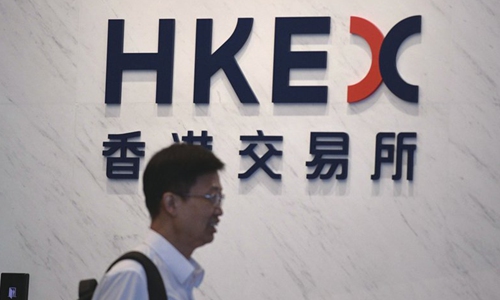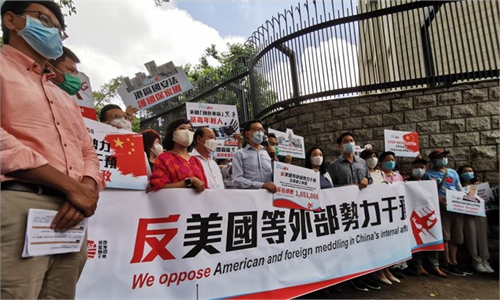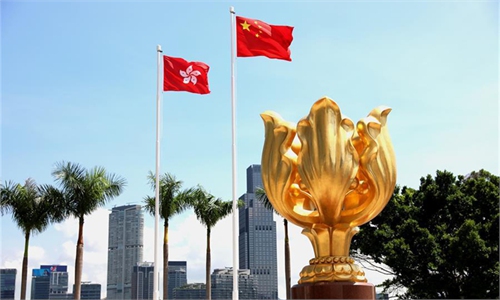HK market sees booming business due to dynamism brought by mainland stock links, IPOs
Dynamism brought by mainland stock links, IPOs

HKEX File Photo
The Hong Kong Stock Exchange (HKEX) has reported record revenues during the first six months this year, driven by the momentum of Hong Kong-Chinese mainland stock link system and the recent trend of mainland-based companies seeking IPOs in Hong Kong.
Observers said the result reconfirms the strength and appeal of Hong Kong as a major global financial hub in the world.
The HKEX on Wednesday said revenues and other income hit a half-yearly record of HK$10.909 billion ($1.68 billion), up 24 percent year-on-year and up 5 percent from the record set in the second half of 2020.
Profit rose 26 percent to reach a record HK$6.61 billion.
HKEX CEO Nicolas Aguzin attributed the rising revenues to multiple factors, including a buoyant IPO market, strong trading volume and the Hong Kong-mainland stock link arrangement.
HKEX said revenues earned through stock link mechanism and other channels reached HK$1.32 billion in the first half, up 78 percent year-on-year.
Average daily turnover in Hong Kong's securities market surged 60 percent year-on-year.
The city's IPO market was brisk in the first half as many mainland-based technology firms went public in Hong Kong, including Kuaishou and JD Logistics. IPOs raised HK$211.7 billion, up 128 percent year-on-year.
The bourse continued its focus on the "China anchored" strategy in the first half, as shown by the expansion of stock connect trading to include A shares listed on the Shanghai STAR Market and their corresponding H shares.
Other such programs included an enhanced bond connect that allowed for more flexible arrangements and more choices for foreign exchange risk management, and an extension of onshore capacity with the launch of the Guangzhou Futures Exchange.
Hong Kong bourse's growth is seen as enhancing Hong Kong's role as Asia's premium financial center, according to Aguzin.
As for the fallout of geopolitical tensions weighing on mareket, Aguzin said the Hong Kong market has seen its average daily turnover soar over the past two years, attesting to the market's resilience.
"I feel very confident that the resilience will be there in the future," he added.
Experts said that the HKEX's booming business again testified to Hong Kong's role as a world financial hub, as the city has weathered multiple challenges arising from social chaos and Western countries' threats to withdraw capital, to the pandemic. But none of those factors caused fundamental harm.
An important driving force behind Hong Kong's financial prosperity is the support from Chinese mainland, they said.
"Hong Kong has the double advantages of standard auditing and international networks, which mainland markets can't match. Those advantages have attracted mainland companies that find it difficult to list in the US," Thomas Yeung, vice dean of the Futian School of Finance, told the Global Times on Wednesday.
"The role of Hong Kong as the world's financial hub has strengthened."
Dong Shaopeng, a senior research fellow at the Chongyang Institute for Financial Studies at Renmin University of China, said the fact that the HKEX's revenues and IPO financing rose despite a stamp duty rise shows that the Hong Kong market's stability and resilience.
A 30 percent stamp-duty hike on stock transactions in Hong Kong came into effect on August 1, the first such move in nearly three decades.
"We totally understand the need to address additional revenues from the government's point of view," especially factoring in the impact of COVID-19 on the local economy," Aguzin said. He vowed to continue to make the city the most efficient and competitive capital market that appeals to investors.
Both experts predicted that more mainland companies will seek to list in Hong Kong next year, as uncertainties linger in China-US relations.
"I believe that more mainland high-tech companies, like e-commerce, app and biotech firms will seek IPOs in Hong Kong. In 2022, the number of mainland IPOs in Hong Kong might increase 30-50 percent compared with this year," Yeung said.
But Dong warned that Hong Kong's role as a world financial hub faces uncertainties, particularly as the US will continue to disturb China, which might affect Hong Kong as well.
Big swings have recently swept through Hong Kong-traded private education firms and online gaming giants amid a new round of tightening regulation by Beijing.
"China is on a long regulatory march toward regulating its Big Tech, [and] this is not too different than we see in many other countries around the world," said Aguzin.
Over the medium term, as new regulations are embraced by the market, investors will accelerate their input, he added.





